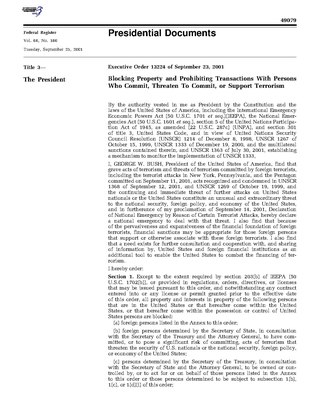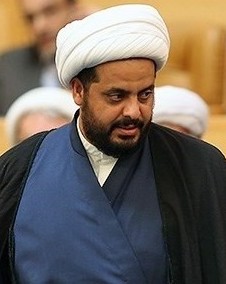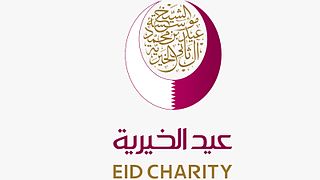
"State Sponsors of Terrorism" is a designation applied to countries that are alleged to have "repeatedly provided support for acts of international terrorism" per the United States Department of State. Inclusion on the list enables the United States government to impose four main types of unilateral sanctions: a restriction of foreign aid, a ban on weapons sales, heightened control over the export of dual-use equipment, and other miscellaneous economic sanctions. The State Department is required to maintain the list under section 1754(c) of the National Defense Authorization Act for Fiscal Year 2019, section 40 of the Arms Export Control Act, and section 620A of the Foreign Assistance Act.

Al-Haramain Islamic Foundation (AHIF) was a charity foundation, based in Saudi Arabia. Under various names it had branches in Afghanistan, Albania, Bangladesh, Bosnia, Comoros, Ethiopia, India, Kenya, Malaysia, the Netherlands, Nigeria, Pakistan, Somalia, Tanzania, and the United States, and "at its height" raised between $40 and $50 million a year in contributions worldwide. While most of the foundation's funds went to feed poor Muslims around the world, a small percentage went to Al-Qaeda, and that money was "a major source of funds" for the terrorist group. In 2003, Saudi authorities ordered Al-Haramain to shut down all overseas branches, and by 2004 Saudi authorities had dissolved Al-Haramain. However, US intelligence officials believed it had reopened branches under new names.

The Maktab al-Khidamat, also Maktab Khadamāt al-Mujāhidīn al-'Arab, also known as the Afghan Services Bureau, was founded in 1984 by Abdullah Azzam, Wa'el Hamza Julaidan, Osama bin Laden and Ayman al-Zawahiri to raise funds and recruit foreign mujahideen for the war against the Soviets in Afghanistan. MAK became the forerunner to al-Qaeda and was instrumental in creating the fundraising and recruitment network that benefited Al-Qaeda during the 1990s.

Executive Order 13224 is an executive order issued by U.S. President George W. Bush on September 23, 2001, as a response to the attacks on September 11, 2001. It has been renewed every year since.
The USA PATRIOT Act was passed by the United States Congress in 2001 as a response to the September 11, 2001 attacks. It has ten titles, each containing numerous sections. Title IV: Protecting the Border aims to prevent terrorism in the USA through immigration regulations. The provisions of the title generally increase the difficulty of entering the country for those known to have, or suspected of having, terrorist intent.

The Office of Intelligence and Analysis (OIA) is a component of the United States Department of the Treasury responsible for the receipt, analysis, collation, and dissemination of foreign intelligence and counterintelligence information related to the operation and responsibilities of the Treasury Department.

Left-wing terrorism or far-left terrorism is terrorism motivated by left-wing or far-left ideologies, committed with the aim of overthrowing current capitalist systems and replacing them with communist or socialist societies. Left-wing terrorism can also occur within already socialist states as criminal action against the current ruling government.
The Global Relief Foundation (GRF), also known as Foundation Secours Mondial (FSML), was an Islamic charity based in Bridgeview, Illinois, until it was raided and shut down on December 14, 2001, and listed among the "Designated Charities and Potential Fundraising Front Organizations for Foreign Terrorist Organizations" ("DCPFFOFTO") by the United States Treasury Department in 2002. According to the US Treasury, "The Global Relief Foundation (GRF) … and its officers and directors have connections to, and have provided support for and assistance to, Osama bin Laden (OBL), al Qaeda (aQ), and other known terrorist groups (OKTG)." It was one of the few organizations registered with the Taliban.

The al-Aqsa Foundation is an international charity established in 1997. The head office of the foundation was located in Germany until it was closed by the German authorities in July 2002. The organisation is known to have local branch offices in the Netherlands, Denmark, Belgium, Sweden, Pakistan, South Africa, Yemen and elsewhere.
The Patriot Act Terrorist Exclusion List (TEL) was a list created by the United States Secretary of State under the authority of Section 411 of the USA Patriot Act of 2001, in consultation with or upon the request of the Attorney General, to designate an organization as a terrorist organization for immigration purposes. The Secretary of State can use classified and/or unclassified information available to the Secretary that a group has committed, or provided material support to further, terrorist acts. A TEL designation attempts to bolster homeland security efforts by allowing the US government to exclude from entry into the United States or to deport aliens associated with entities on the TEL. The list was updated on November 5, 2020, when the U.S. Department of State removed the East Turkestan Islamic Movement (ETIM) from the TEL. This was the first update since 2014.

Yassin Abdullah Kadi is a Saudi Arabian businessman. A multi-millionaire from Jeddah, Kadi trained as an architect in Chicago, Illinois. He is the son-in-law of Sheikh Ahmed Salah Jamjoom, a former Saudi Arabian government minister with close ties to the Saudi royal family.

Qais Hadi Sayed Hasan al-Khazali is an Iraqi politician and militant leader who is the founder and Secretary-General of the Asa'ib Ahl al-Haq, an Iraqi Shi'ite paramilitary organization and political party. He is best known as the founder and leader of the Iran-backed Special Groups in Iraq from June 2006 until his capture by British forces in March 2007. As head of the Special Groups, Khazali directed arms shipment, formation of squads to participate in fighting, and insurgent operations, most notably the 20 January 2007 attack on American forces in Karbala. A former follower of Muqtada al-Sadr, he was expelled from the Mahdi Army in 2004 for giving "unauthorized orders" and founded his own group: Asa'ib Ahl al-Haq (AAH) also known as the "Khazali Network" that was later designated as a terrorist group by the U.S. Department of State. During his incarceration, Akram al-Kaabi became acting commander of the organization until his release.

Mohammed Abdel Karim Al Ghezali is a citizen of Yemen who was one of the founders of Al Qaeda in the Arabian Peninsula, in 2009, and remains one of its senior leaders. CBS News reported that Al Ghezali appeared in a September 2009 fund-raising video with Said Ali Al Shiri, the second in command of Al Qaeda in the Arabian Peninsula.
A Specially Designated Global Terrorist (SDGT) is a person or entity that has been designated as such by the United States Department of State or the US Department of the Treasury. An SDGT designation is made under authority of US Executive Order 13224 of September 23, 2001, as amended by Executive Order 13268 of July 2, 2002, and Executive Order 13284 of January 23, 2003, and Title 31, Parts 595, 596, and 597 of the US Code of Federal Regulations, among other US laws and regulations. The main regulatory framework underlying the SDGT designation was established two weeks after the September 11 attacks in 2001 by US President George W. Bush.
The Union of Good, also known as the Charity Coalition, is an umbrella organization consisting of over 50 Islamic charities and funds which funnel money to organizations belonging to Hamas, which currently rules the territory of the Gaza Strip. Hamas, which characterizes itself as an "Islamic resistance movement against Israeli occupation" is also on the US State Department list of Foreign Terrorist Organizations.

The Specially Designated Nationals and Blocked Persons List, also known as the SDN List, is a United States government sanctions/embargo measure targeting U.S.-designated terrorists, officials and beneficiaries of certain authoritarian regimes, and international criminals. The list is managed by the U.S. Treasury’s Office of Foreign Assets Control (OFAC). When individuals are added to the list of Specially Designated Nationals (SDN), their U.S. assets are blocked. Moreover, their names are added to automated screening systems used by banks in the United States and many foreign countries, making it difficult for them to open or hold accounts, transfer money, or transact properties internationally. Any individual or entity that provides support related to terrorism, drug trafficking or unauthorized military use to any person or entity appearing on the SDN list risks being penalized under the USA PATRIOT Act.

The Master of Martyrs Battalions, or Kata'ib Sayyid al-Shuhada' (KSS), officially the 14th Brigade, is a radical Iraqi Shia militia formed in 2013. Its stated mission is to protect "(Shia) shrines across the globe", preserve "Iraqi unity" and to "put an end to the sectarian conflict". KSS is funded, trained and equipped by IRGC's Quds Force and Hezbollah.
Qatar has been accused of allowing terror financiers to operate within its borders, which has been one of the justifications for the Qatar diplomatic crisis that started in 2017 and ended in 2021. In 2014, David S. Cohen, then United States Under Secretary of the Treasury for Terrorism and Financial Intelligence, accused Qatari authorities of allowing financiers who were on international blacklists to live freely in the country: "There are U.S.- and UN-designated terrorist financiers in Qatar that have not been acted against under Qatari law." Accusations come from a wide variety of sources including intelligence reports, government officials, and journalists.

Sheikh Eid Bin Mohammad Al Thani Charitable Association is a Qatari charitable organizations established in 1995 in Doha, Qatar. The organization was named after Sheikh Eid Ibn Mohammad ibn Thani ibn Jasim ibn Mohammad Al Thani (1922-1994). The U.S. Department of Treasury has characterized the organization's founder as "terrorist financier and facilitator who has provided money and material support and conveyed communications to al-Qa'ida and its affiliates in Syria, Iraq, Somalia and Yemen for more than a decade. ” The Eid Charity Foundation has been described as a Government Organized Non-Governmental Organization (GONGO) with close ties to government institutions.











